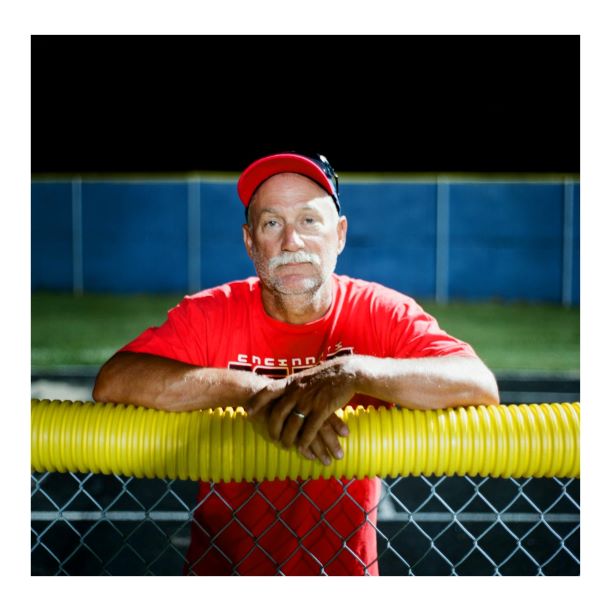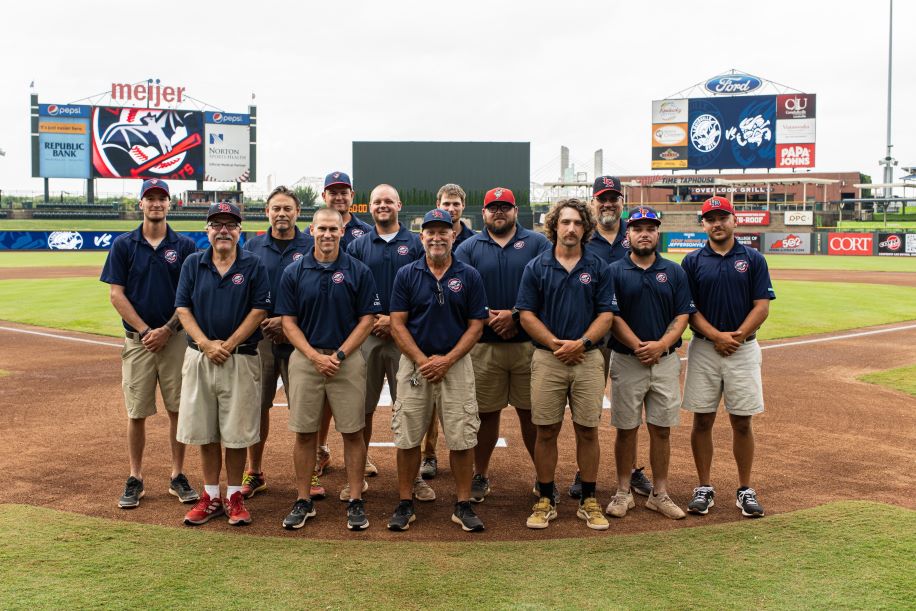In this edition of the SportsField Management Interview, we meet Tod Shafer, head groundskeeper, Louisville Slugger Field, home of the Louisville Bats, Triple-A professional baseball affiliate of the Cincinnati Reds.
SportsField Management (SFM): You started in a different career – in a different industry. Please tell me a little bit about that, and what led you to a career in sports field management.
Shafer: As an air traffic controller, a federal government job, I started pretty much right out of college. I always had an interest in aviation. My first thought was airport manager, but I then had a friend tell me about air traffic control, which I knew nothing about. I visited a couple towers in Ohio, and I thought it was really cool. So I took the test, and I scored high enough to get hired – and what a career. It was fantastic. But like any other job, it turned into a job. If I could have spent all my time just sitting there talking to airplanes – well, I couldn’t be there now because I was forced to retire in 2013 at the age of 56 – I would have stayed as long as I possibly could. It was just a lot of fun. I compare it to playing a video game – you just don’t let the little things get too close. Of course, that kind of scares people when I tell them that; but that is the attitude you had to take, because you have a lot of people’s lives in your hands. It was like putting together a big puzzle most of the time, figuring out how to get them in safely and quickly. You have to have a bit of an ego to do it, because you have to be in control of a lot of things at one time. But it gives you a lot of confidence when you can do it. If any kids ask me about it, I shove them right to it. It gave me 25 years of government service, and a fantastic retirement. I was eligible to retire at 49. It gave me a chance to have a second career, which I’m right in the middle of.
SFM: The traditional perception of air traffic control is that it is extremely high stress. Did you find it as stressful as what they say, and how does that compare to something like sports field management?
Shafer: I did not find it stressful whatsoever. Now, I was at Tallahassee, Florida, and Louisville, Kentucky. We have our fair number of airplanes, but I didn’t work at Atlanta or Chicago, where it is just continuous bunches of airplanes. It is what you make of the job. I always felt confident that I could do the job, so I was never too stressed. You may have a short, stressful moment – an airplane may come in and declare an emergency, and your heart would start pumping. But I get from a lot of people, “Wow, that must have been stressful.” And I tell them that it is nowhere near as stressful as sports field management. We sit in the radar room or the tower, in a nice, heated building. If weather comes in, you just have to work with it. You have to move airplanes around. Here, we don’t have that option. It’s “Do I pull the tarp?” “When do I pull the tarp?” “Are the umpires going to let me pull the tarp?” Especially during the game, you don’t have control. The control is with the umpires. And that is very new to me, because I always made the decisions, right then and there.
SFM: What led you to your second career in sports field management?
Shafer: In 2008, my son made the high school baseball team. I of course watched the games, and I noticed that our high school coach – Scott Gerlach – would be trying to coach, and then would go to the pitcher’s mound to patch the mound. I had some time, so I asked him if he could use some help. I no longer got that question out of my mouth, and he said “Yes.” But I knew nothing. I grew up on a farm, so I watched corn and soybeans grow, but I didn’t know anything about growing high-quality grass. I started mowing the fields for him. Scott also worked for the Louisville Bats as a game day guy, so he would show me different things for taking care of the high school field. I realized that this is a lot of fun. He would bring ideas to me that he learned at Louisville Slugger Field, and I would use those at the high school field. Then I jumped into the internet, SFMA, and the magazine, and just ate it all up. At the end of the 2012 season, I knew I was retiring, so Scott asked me to come down and volunteer with the Bats. I came down the last two days of the season in 2012, and worked with Tom Nielsen and the guys here. We had two horrible days. We had in-game rain when the umpires wouldn’t let us pull the tarp, so we were flying back and forth to bring bags of conditioner onto the field. I’m 50-plus years old out there carrying 50-pound bags, thinking I’m going to die – but I kept chugging. Tom hired me right then and there. I retired in February, and began working game day here in April. Working for Tom was just a blast. I love the work. People asked why I wanted another job. And I said, “I don’t have another job – it’s playtime.” To this day, I still look at it that way.
SFM: From that point until now, what was your progression within the industry?

Shafer: Tom hired me as game day, and I began that in 2013. I then became seasonal full time for him. A couple years later, I ended up being one of his assistants. Then Dan Blank was here with Tom one year, and I got to go out to Omaha with Dan to work the College World Series, and that was an amazing experience for me. I did that for four or five years. I missed it this year because of my job here, and I was dying watching the games on TV. Then, Christo Wallace from the Reds called me last year and gave me a chance to go up to the majors. I mowed the Great American Ballpark field and did whatever was needed there, but I always hung on to Louisville and the Bats. That’s where I got started. It was home. They called this past winter and offered me the head job here. I came home and had a wonderful year.
SFM: Obviously, this has been a big year for you with becoming head groundskeeper in Louisville. What can you tell me about your role there now, your crew/staff, your approach to the job, and the overall work at Louisville Slugger Field?
Shafer: As head groundskeeper, I make most of the decisions on the field. That’s what they pay me for. As for my crew, all of our guys came back from when Tom was here to help the old man. And they were above and beyond any hopes I could have possibly had. We have some new guys, but a lot of the kids came back. And I call all these guys my kids. Two or three of them are older than I am, but I still call them my kids. The work they did was absolutely phenomenal. My assistant was here last year, he stayed on. Garret Haller was excellent to work with. He handled a ton of the odd jobs; things like building helmet racks and bat racks for the dugouts, and he did a lot of the clay work for me this year. We always bounce things off each other. We usually had six people total (four plus Garrett and me) all day throughout the season, and then we would have four to six game day people come in. It was so easy, because pretty much everybody was experienced here at Slugger. I went back to Tom’s way of doing things, because that’s the only way I knew. It helped everybody to go back to things we were familiar with, and it just flowed so well. I cannot say enough about my kids.
SFM: Beyond the baseball season, how much do you have to deal with in terms of other events on your field.
Shafer: It’s not too bad. We have a few things. Thunder Over Louisville is the beginning of the Kentucky Derby Festival. That is mid-April. We have a huge fireworks show, so there are a bunch of people on the field for the fireworks. With all the COVID concerns, there were various corporate events on the field – corporate batting practices, kickball games, wiffleball games – which is pretty normal for a Minor League Baseball Field. We had Nitro Circus in June, and that was quite a challenge. We now have Louisville Live coming up, which is the University of Louisville’s basketball event. They are going to build a full-size basketball court clear through my infield, along with a stage and 600 to 700 people down on the field. We are all looking forward to it. We will see how the field holds up; bermudagrass in late October – not the best time to be doing things like this, but that’s the way it goes. But we kept things to a minimum this year. There were talks of concerts, but nothing came through. But I’m sure they are coming.
SFM: What are the biggest challenges you face, and how do you approach those challenges?
Shafer: The main challenge that I run into – and I’m pretty sure every Minor League groundskeeper will tell you the same thing – is money. With COVID, the hit that Minor League Baseball took. Trying to recover from that. Trying to get people back in the stands. We have a lot of old equipment and have not been able to buy new equipment. And now some companies don’t even have equipment available. So, it’s trying to put Band-Aids on all your stuff to keep things kicking to maintain the field to the proper level. I know I’m not the only one dealing with that, but that has been the biggest challenge.
We did pretty well on supplies, and I have some of the best vendors in the world. We tried to always think ahead so that we could plan for maybe not getting something on time. But my two guys did a tremendous job as far as that goes.
SFM: I know you were named a Pioneer Athletics Pioneer in the Field. What accomplishments are you most proud to have achieved in your career as a sports field manager?
Shafer: The Pioneer in the Field was quite a shock to me. It meant a lot. I’m proud of how I moved up the ladder here relatively quickly. Tom has become a brother to me. We talk every day. One of the proudest moments for me was, in his last year here – in 2019 – we were SFMA Field of the Year for professional baseball. So that meant a ton to me and Aaron Fink, who was Tom’s first assistant (I was second assistant), that we were able to get that for him in his last year. My College World Series days – love them. My time with the Reds was phenomenal. Those may not be awards, but they are awards to me. They are things that I loved doing, and am very proud that I had the chance to do.
I think my proudest moment was this past spring. The president of North Oldham Little League, where my son played – and where I did a lot of work on their fields – asked me to throw out the first pitch of the season. That meant a ton.
SFM: You mentioned some of your mentors, but what is the most important thing you have learned? And is there anyone else you would like to mention?
Shafer: Patience. Lots of patience. With your crew. With the coaches, managers, teams, front office. A lot of patience.
Tom Nielsen is the main character in this little adventure. My vendors – chemical and seed guys – Steve Griggs and Dave Sullivan with SiteOne. Those are the three main guys who have gotten me through this. Steve and Dave have taught me so much. I trust them with anything. They are not just out to make money. They are out to make all of us look good. And that means the world.
With Tom, there are no words.
But there are so many people: Derrik Grubbs, Christo Wallace, and Devin Herman with the Reds. Dan Blank and Eric Williams with the College World Series. Then, back home here, Tom, Aaron Fink, and Scott Gerlach. Those guys are why I’m still here. I could rattle off a hundred people, and I’m sure I’m not the first groundskeeper who has told you that.
As far as mentors in life, of course, my parents. And my wife, Liz, and my son, Tommy. My wife and I both started second careers about the same time. She was a pharmacist. She was in her early 40s and went back to school to become a horse veterinarian. About the same time, I was retiring and becoming a groundskeeper. So, we leaned on each other for that, and it has been thrilling to watch her to grow. She went back to school and graduated with highest honors. My son, unfortunately, has had two kidney transplants. And not long after he got married, his wife, Paige, was diagnosed with breast cancer (in her mid-20s). They are phenomenal kids. That is where all of my strength comes from – from those three.
SFM: Outside of work, what are your areas of interest or hobbies?
Shafer: Going to baseball games, and getting to actually sit and watch one. My wife and I like to take long weekends and do a bit of traveling. Nothing too crazy. I like to go back to Ohio and visit with family – that’s where I grew up.
I come in here every day, and I love doing it. This is my hobby. Luckily, I get paid to do it.
SFM: What is the best part of the job?
Shafer: Showing up every day, and getting to play in the grass.



